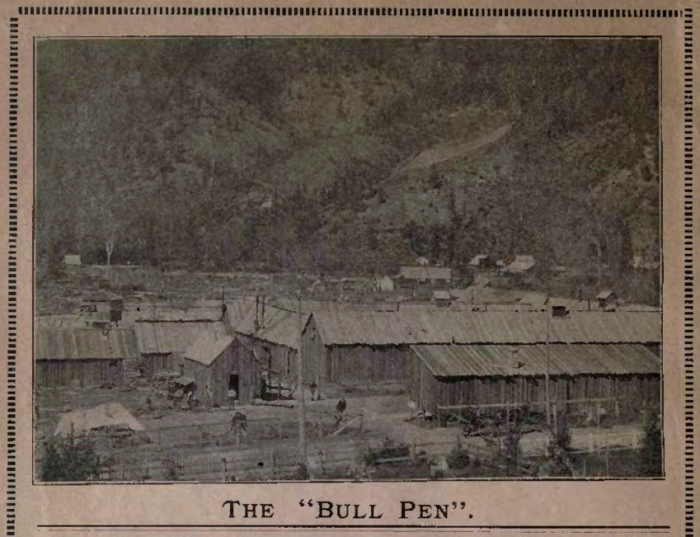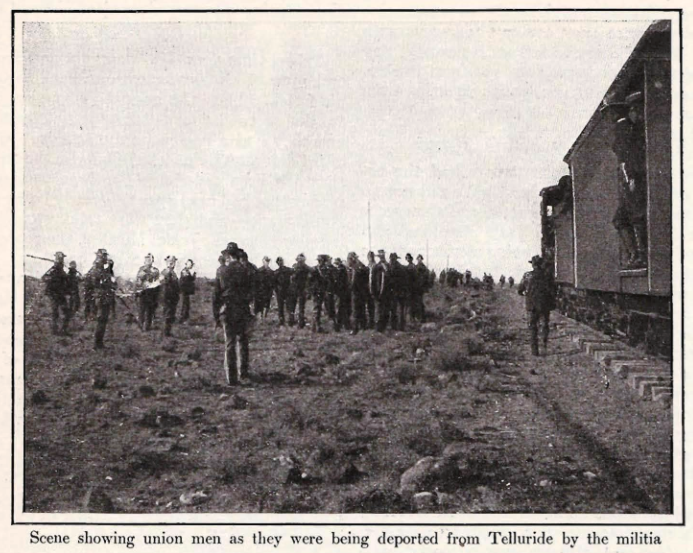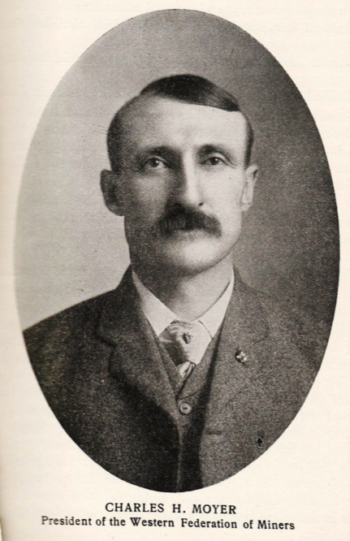You ought to be out raising hell.
This is the fighting age.
Put on your fighting clothes.
-Mother Jones
Hellraisers Journal, Sunday December 2, 1906
Denver, Colorado – U. S. District Court Upholds Autocracy
From the Appeal to Reason of December 1, 1906:
THE “BULL PEN” LEGALIZED!
—–Decision of Federal Judge Invests
Governors of States with
Autocratic Power.
—–
WHEN an insurrection is declared by the governor to exist in any part of Colorado a citizen of the district affected by the proclamation of the chief executive of the state may be imprisoned and detained at the will of the military authorities, according to an opinion handed down by Judge R. E. Lewis in the United States district court in Denver, Colo., Monday, November 19. Such action by the military authorities is declared not to be a violation of the fourteenth amendment, or of the law providing for the writ of habeas corpus.
This decision, which is one of the most important announced in a Colorado court in recent years, was handed down in the case of Charles H. Moyer, president of the Western Federation of Miners, vs. James H. Peabody, former governor of Colorado, Sherman Bell, former adjutant general, and Bulkeley Wells, now adjutant general, but at the time of the commission of the act of which plaintiff complained an officer in the Colorado national guard. Mr. Moyer had sued for $100,000 damages for alleged false imprisonment during the strike troubles in San Miguel county two years ago. The demurrer of the defendants was sustained.
Its Far-Reaching Significance.
Not since the famous “Moyer decision,” written by John M. Waldron, the celebrated attorney for the allied corporate interests of Colorado, and handed down by Judge Gabbart, chief justice of the Colorado supreme court, has there been an opinion rendered by any jurisdiction in the land that can compare in significance to this recent decision by Judge Lewis. In its far-reaching influence this “Lewis ruling” eclipses the “Moyer decision” as much as the power of the federal courts transcends that of the state courts. This latest decree puts the seal of federal approval upon the unconstitutional and high-handed proceedings sanctioned by the Colorado supreme court.
Here is what the “Lewis ruling” upholds and sustains:
On any occasion and at any time, determined by the governor himself, the governor of Colorado can declare any or every portion of the state in a condition of rebellion, can declare martial law, throw troops into the district alleged to be in rebellion, and, at will, arrest any or all of the citizens of the district and hold them in military custody at the pleasure of his imperial will.
Affects Workers in Every State.
The full import of the foregoing paragraph should sink into the inner consciousness of every reader of this paper. For, by the “Lewis ruling,” the outrageous situation that has heretofore obtained in Colorado is now extended to every state where waves the stars and stripes. What was before merely a state affair has now become a national condition. That is, unless the “Lewis ruling” is overruled and set aside by the United States supreme court, which is unlikely.
To understand this decision thoroughly a brief recapitulation of the case is necessary. More than two years ago the Mine Owners’ association in Colorado decided to wage a war of extermination against the Western Federation of Miners. Preparations for this fight were made when the mine owners captured the state government by electing Peabody governor and buying outright the state supreme court. Then the initiative was taken against the miners’ union by forcing that organization into a strike. After the strike was declared the mine owners, to further their purposes, hired agents to start a reign of terror in the districts affected by the strike. This was done to warrant the call of troops. The mine owners’ governor hearkened to the call and declared martial law. Then it was that the deportations were ordered, and the arrest of the officers of the Western Federation of Miners was made.
Moyer Decision Upheld.
March 30, 1904, by order of the governor of the state, who, in fact, was commander-in-chief of the military, Charles H. Moyer was arrested and confined until June 15, 1904, in the “bullpen” in the town of Telluride, in the county of San Miguel. During his imprisonment he was subjected to humiliation and torture and every indignity which the cruel ingenuity of his captors could inflict. Only the horrors of Andersonville and Libby could compare with the frightful atrocities visited upon the head of the Federation leader held in the Telluride bastile. As a result of this experience, Moyer’s health was undermined, and he was made a consumptive invalid for life.
Knowing their subserviency to the Mine Owners’ association, and their open hostility to the first principles of right and justice, the attorneys for Moyer, in the suit for damages, ignored the Colorado courts, and commenced action in the federal circuit court. The suit was brought, not so much to recover damages for Moyer, as to determine the federal constitutionality of the famous “Moyer decision,” handed down by Judge Gabbart. So far as Judge Lewis is concerned, that famous decision violates none of the provisions of the fourteenth amendment, nor is it unconstitutional in any particular.
Makes Striking Impossible.
If the United States supreme court affirms the decision of the circuit court, then woe be unto the next detachment of workingmen who dare go on strike. In case of a strike, according to the “Lewis ruling,” the governor of the state in which the strike occurs can declare the strike district under martial law, order out the militia, seize and detain or deport as many of the strikers as may be necessary to “suppress the insurrection.” And the persons thus arrested, detained or deported have absolutely no recourse at law to recover damages or redress an injury inflicted upon them. Not in Colorado alone does this condition now obtain; it applies with equal force in every state in the union.
Maybe this “Lewis ruling” wont [?] make the working class of the United States sit up and take notice!
———-
[Photograph added.]
SOURCE
Appeal to Reason
(Girard, Kansas)
-Dec 1, 1906
https://www.newspapers.com/image/67586761/
IMAGES
WFM Colorado Strikes 1903-1904, The Bull Pen
http://darrow.law.umn.edu/photo.php?pid=787
WFM Colorado Strike 1903-1904, Telluride deportations
http://darrow.law.umn.edu/photo.php?pid=608
Charles Moyer, Darrow Collection
http://darrow.law.umn.edu/photo.php?pid=1384
See also:
Hellraisers Journal: Supreme Court of Colorado Upholds Governor Peabody. Is a strike an insurrection?
http://www.dailykos.com/story/2014/7/17/1314605/-Hellraisers-Journal-Supreme-Court-of-Colorado-Upholds-Govenor-Peabody-Is-a-strike-an-insurrection
Hellraisers Journal: President Charles Moyer Very Ill in Solitary Confinement in Ada County Jail
http://caucus99percent.com/content/hellraisers-journal-president-charles-moyer-very-ill-solitary-confinement-ada-county-jail
From The New York Times of July 2, 1904:
“COLORADO JUDGE SCORES COURT AND GOV. PEABODY; Justice Steele Says State Executive Violated Constitution”
http://query.nytimes.com/gst/abstract.html?res=9402E2DB1130E333A25751C0A9619C946597D6CF&legacy=true
The Pacific Monthly, Volume 20
Pacific Monthly Publishing Company, 1908
https://books.google.com/books?id=rLxOAQAAMAAJ
Sept 1908 Edition
https://books.google.com/books/reader?id=rLxOAQAAMAAJ&printsec=frontcover&output=reader&source=gbs_atb&pg=GBS.PA235
“Conspiracies of Capital and the Courts”
by C. P. Connolly
https://books.google.com/books/reader?id=rLxOAQAAMAAJ&printsec=frontcover&output=reader&source=gbs_atb&pg=GBS.PA279
Indeed the US Supreme Court did rule against Moyer:
Moyer v. Peabody, 212 U.S. 78 (1909)
https://en.wikipedia.org/wiki/Moyer_v._Peabody
https://supreme.justia.com/cases/federal/us/212/78/case.html
“INDEFINITE DETENTION: Using Outdated Precedents To Defend Unjust Policies”
-by JOANNE MARINER (2002)
http://writ.news.findlaw.com/mariner/20020917.html
The Cripple Creek Strike: a History of Industrial Wars
in Colorado
-by Emma Florence Langdon
Moyer Habeas Corpus Case
http://www.rebelgraphics.org/wfmhall/langdon19.html
Haywood-Moyer-Pettibone Case
http://www.rebelgraphics.org/wfmhall/langdon29.html#dedication
Transcript of Record: Moyer v Peabody
Supreme Court of the United States
https://books.google.com/books/reader?id=4DcrAAAAYAAJ&printsec=frontcover&output=reader&source=gbs_atb&pg=GBS.RA1-PR1
~~~~~~~~~~~~~~~~~~~~~~~~~~~~~~~~~~~~~~~~~~~~~



